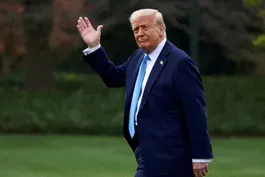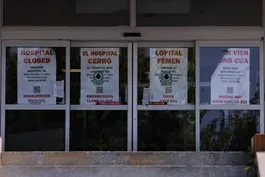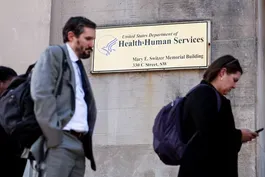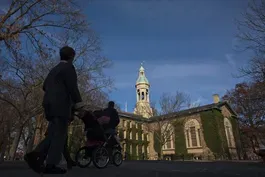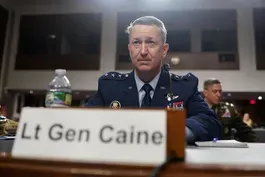
Library and museum support agency faces massive cuts
Clip: 4/1/2025 | 6m 15sVideo has Closed Captions
Library and museum support agency faces massive cuts after Trump order
It’s a small federal agency few have heard of, but it has a large impact around the country. The Institute of Museum and Library Services is the largest source of federal funding for museums and libraries and the Trump administration has placed roughly 80 percent of IMLS staff on administrative leave. Senior arts correspondent Jeffrey Brown reports for our arts and culture series, CANVAS.
Problems with Closed Captions? Closed Captioning Feedback
Problems with Closed Captions? Closed Captioning Feedback
Major corporate funding for the PBS News Hour is provided by BDO, BNSF, Consumer Cellular, American Cruise Lines, and Raymond James. Funding for the PBS NewsHour Weekend is provided by...

Library and museum support agency faces massive cuts
Clip: 4/1/2025 | 6m 15sVideo has Closed Captions
It’s a small federal agency few have heard of, but it has a large impact around the country. The Institute of Museum and Library Services is the largest source of federal funding for museums and libraries and the Trump administration has placed roughly 80 percent of IMLS staff on administrative leave. Senior arts correspondent Jeffrey Brown reports for our arts and culture series, CANVAS.
Problems with Closed Captions? Closed Captioning Feedback
How to Watch PBS News Hour
PBS News Hour is available to stream on pbs.org and the free PBS App, available on iPhone, Apple TV, Android TV, Android smartphones, Amazon Fire TV, Amazon Fire Tablet, Roku, Samsung Smart TV, and Vizio.
Providing Support for PBS.org
Learn Moreabout PBS online sponsorshipGEOFF BENNETT: It's a small federal agency few have heard of, but with a large impact across the country.
That's the Institute of Museum and Library Services, or IMLS.
AMNA NAWAZ: And, yesterday, the Trump administration placed roughly 80 percent of its staff on administrative leave.
Senior arts correspondent Jeffrey Brown has this report for our arts and culture series, Canvas.
JEFFREY BROWN: Libraries are for checking out books, of course, but these days they serve a variety of other functions as well, providing residents with access to computers and the Internet, refuge during extreme weather, a place to vote, and a variety of classes, including language and fitness.
For their part, major museums with blockbuster exhibitions may get the most attention, but, around the country, museums come in all sizes and themes, many focused on aspects of local life.
The main source of federal funding for libraries and museums, the Institute of Museum and Library Services, or IMLS, established in 1996.
Its 2024 budget of over $290 million was larger than two other better-known culturally-focused agencies, the National Endowment for the Arts and National Endowment for the Humanities.
But a recent executive order by President Trump named the IMLS as one of seven small federal agencies to be -- quote -- "eliminated to the maximum extent consistent with applicable law."
In a statement provided to the "News Hour," an administration official said yesterday's action is "part of a mandate to reduce bureaucracy and is a necessary step to fulfill that order and ensure hard-earned tax dollars are not diverted to discriminatory DEI initiatives or divisive anti-American programming in our cultural institutions."
And for a response to all this, I'm joined by Cindy Hohl.
She's a Kansas City librarian and current president of the American Library Association.
So thanks for joining us.
So this is an agency few of us know about, but important to you and your members.
How important?
What kind of role does it play?
CINDY HOHL, President, American Library Association: Absolutely.
The Institute for Museum and Library Services is a federal agency that was created by Congress to improve and support the nation's public libraries and museums.
And so this funding has been critical to especially small and rural libraries all across the country.
We have seen IMLS monies going towards research and policymaking and grants.
And this funding has been critical to Americans.
JEFFREY BROWN: In the statement we received from the administration about yesterday's action, it referred to DEI or anti-American programming.
Do you know what that might be referring to?
What's your response to that?
CINDY HOHL: Well, libraries are here to connect all people to information and ideas.
We believe that all Americans should have equal rights to access accurate information from credible sources.
And so it's so important that Americans continue to be able to have access to programs that enrich their lives, educational programs.
And, of course, if we're talking about libraries, it's going to be literacy-based.
And so the focus of programming in any public sector is to always be able to provide information to people that is credible and trusted.
JEFFREY BROWN: I understand it's different with different libraries in different states, but is it possible to say how much of the funding would be impacted by the loss of this agency?
CINDY HOHL: It's so important that everyone has access to IMLS funding.
So, the current IMLS funding is funneled down through the state library agencies.
And these state library agencies provide funding allocated across their state for libraries to be able to offer programs such as summer learning and reading.
And that's something that has been so important to Americans.
JEFFREY BROWN: One argument you could imagine against the IMLS right now, there has to be budget cuts.
This agency's only been around since 1996.
Why not go to a time before that?
What's the need for the agency now?
What would be your response to that?
CINDY HOHL: We have never needed information accessible and accurate in a more greater time period.
When you look at libraries providing essential services to the public, they should be open, and everyone should have unfettered access to those library spaces, and museums as well.
When we look at the history of this country, it's important that Americans are able to read about the history of the people who help founded this nation and those who continue to work in these public spaces in present day.
When we look to the strength of libraries, it's always important that we look at all of the different ways that libraries provide services to people.
There are many people who cannot afford Internet access in their homes.
And they rely upon their local public library to be able to access Internet services, so that they can apply for jobs and benefits, so that they can even have access to telehealth appointments with their health care provider.
When you look at all of the things that libraries offer, we always need more service, and we need to invest in our communities, so that everyone has access to information.
JEFFREY BROWN: And, very briefly, how much are you able to push back with -- along with the museums to fight this?
Do you anticipate that this agency will soon be gone?
CINDY HOHL: We encourage every American to reach out to the representatives and to let them know how important libraries are in their community.
With 125,000 libraries in this country, we have many opportunities here to help our representatives know that Americans love their libraries and that we expect to have access to information.
JEFFREY BROWN: All right, Cindy Hohl is the president of the American Library Association.
Thank you very much.
CINDY HOHL: Thank you.
After quake, aid groups warn Myanmar has overwhelming need
Video has Closed Captions
After quake, aid groups warn Myanmar has overwhelming need for food, water and health care (3m 44s)
Businesses brace for Trump’s tariffs as Democrats push back
Video has Closed Captions
Businesses brace for Trump’s new tariffs while Senate Democrats try to push back (2m 44s)
How food aid made it hard for Haiti to produce its own
Video has Closed Captions
How efforts to send Haiti cheap rice made it hard for the nation to produce its own (10m 42s)
The impact of private equity's expansion into health care
Video has Closed Captions
The impact of private equity's expansion into health care (7m 3s)
Mass firings begin at government health agencies
Video has Closed Captions
Mass firings begin at government health agencies, including FDA, CDC and NIH (4m 13s)
News Wrap: Bondi seeks death penalty for Luigi Mangione
Video has Closed Captions
News Wrap: Bondi directs federal prosecutors to pursue death penalty for Luigi Mangione (5m 51s)
Professor explains why he's leaving Yale amid Trump threats
Video has Closed Captions
Professor explains why he's leaving Yale for Toronto as colleges react to Trump's threats (6m 42s)
Trump's Joint Chiefs pick faces questions from senators
Video has Closed Captions
Trump's pick to lead Joint Chiefs tells senators he would stay out of politics (4m 27s)
Providing Support for PBS.org
Learn Moreabout PBS online sponsorshipMajor corporate funding for the PBS News Hour is provided by BDO, BNSF, Consumer Cellular, American Cruise Lines, and Raymond James. Funding for the PBS NewsHour Weekend is provided by...

